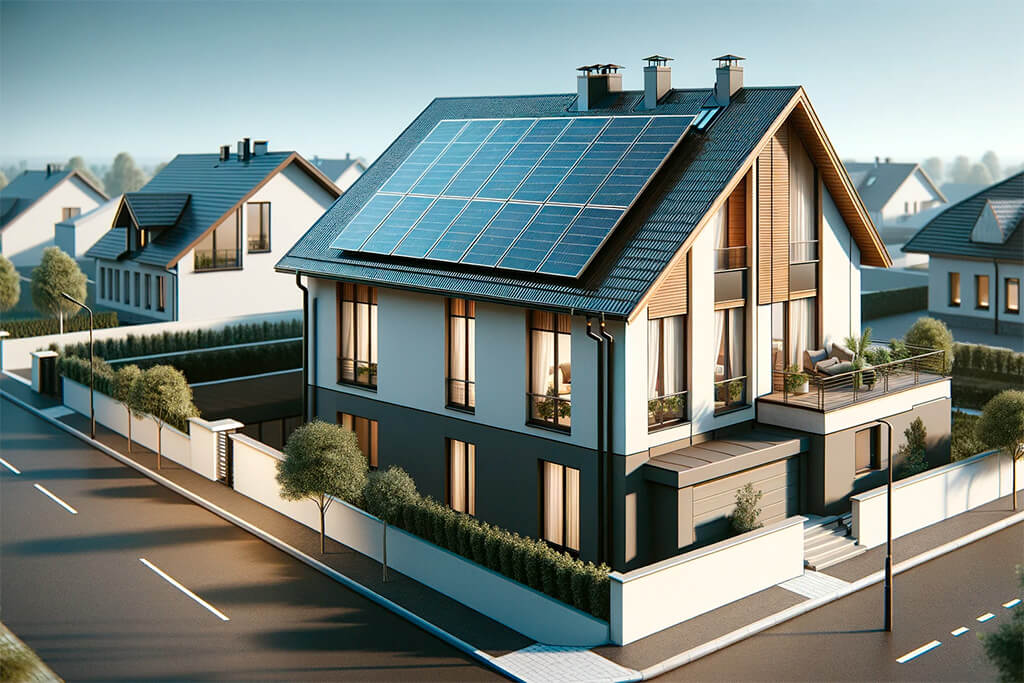In the ever-evolving world of home construction and renovation, one trend that’s making a significant impact is the integration of solar panels. This surge in popularity isn’t just a fleeting fashion, it’s a substantial shift towards more energy-efficient and value-added homes. For homeowners, DIY handymen, and self-employed contractors, understanding the ins and outs of solar panel installation is becoming increasingly essential. It’s akin to updating your toolkit – a necessary step to stay current in the modern construction landscape.

The Solar Panel Advantage: An Overview
Solar panels function as mini power stations right on your roof, harnessing sunlight and converting it into electricity. This process not only reduces dependence on traditional power sources but also significantly lowers utility bills. More importantly, from an environmental standpoint, solar panels represent a sustainable energy solution, reducing the carbon footprint of your home.
The real value of solar panels, however, transcends mere energy savings. They represent a forward-thinking approach to home improvement, aligning with contemporary trends in eco-conscious living and energy efficiency. In the construction and renovation sector, solar panels are increasingly seen as a mark of a modern, updated home.
Do Solar Panels Increase Home Value?
The question of whether solar panels add value to a home is met with a resounding yes. This is comparable to other major home improvements, like upgrading to energy-efficient windows or a high-efficiency HVAC system. Homes equipped with solar panels tend to sell at a premium compared to those without. Studies, including those conducted by reputable institutions like the Lawrence Berkeley National Laboratory, corroborate this, showing a consistent increase in home values post-solar panel installation.

How Much Do Solar Panels Increase Home Value?
The degree to which solar panels boost home value varies, but a general trend can be observed. On average, homes with solar panels see an increase in value by about 4.1%. This figure can be likened to the value addition seen with major kitchen or bath remodels. However, it’s crucial to note that the increase in home value hinges on several factors: the quality of the solar panels, the professionalism of the installation, and the geographical location of the property.
For instance, in sunnier regions, the value added by solar panels can be significantly higher due to the greater potential for energy generation. Moreover, the local market’s perception of solar energy can influence the added value. In communities where environmental sustainability is highly valued, solar panels can be a major selling point.
To sum up, solar panels are not just a nod to environmental consciousness, they represent a savvy investment in the value of a property. Whether you’re a homeowner looking to enhance your property’s worth or a contractor advising clients on profitable renovations, solar panels are a pivotal consideration in today’s real estate market. Their integration into home design signifies a blend of modern efficiency and long-term economic benefit.
The Cost-Benefit Analysis of Solar Panel Installation
When evaluating the cost versus benefits of solar panel installation, think of it as a long-term investment in your home. The initial expenditure, admittedly, is not insubstantial. You’re looking at the cost of the panels themselves, along with the necessary components like inverters and mounting systems. On average, a homeowner might invest anywhere from $15,000 to $25,000.
However, the long-term benefits can be substantial. Once operational, solar panels drastically reduce your monthly energy bills – savings that accumulate significantly over time. Additionally, many states offer attractive tax incentives and rebates for solar panel installation, which can further offset the initial costs. It’s similar to when you invest in high-quality insulation: the upfront cost is quickly mitigated by the ongoing energy savings.

Market Trends: Solar Panels and Home Buyers
In today’s real estate market, homes with solar panels have a distinct advantage. Think of solar panels as a modern upgrade, akin to a renovated kitchen or a professionally landscaped garden, in terms of their appeal to potential buyers. There’s a growing trend of homebuyers seeking eco-friendly and energy-efficient homes. In areas where green living is prioritized, homes with solar panels are often more desirable and can command a higher sale price. It’s an investment that not only benefits the environment but also enhances the marketability of your home.
Installation and Maintenance: What Homeowners Need to Know
Installation of solar panels should always be entrusted to professionals. The process involves several critical steps:
- Site Assessment: This initial step involves a professional evaluating your roof for suitability, including its condition, orientation, and any potential shading.
- Permitting: Similar to any major home improvement project, solar panel installation requires adherence to local building codes and often necessitates obtaining the necessary permits.
- Installation: Professional installation is key. This process includes mounting the panels, connecting the inverter, and integrating the system into your home’s electrical grid. Typically, this is completed within a few days.
- Maintenance: Fortunately, solar panels require minimal maintenance. Regular cleaning to remove dust and debris, and occasional professional inspections are generally sufficient to ensure optimal performance.

